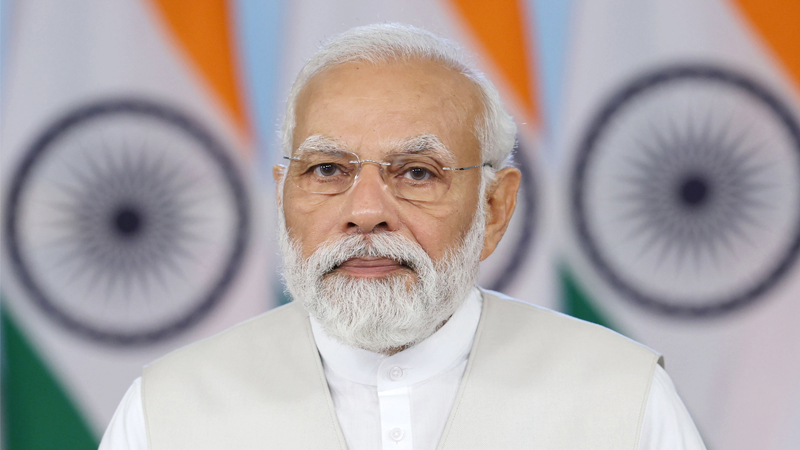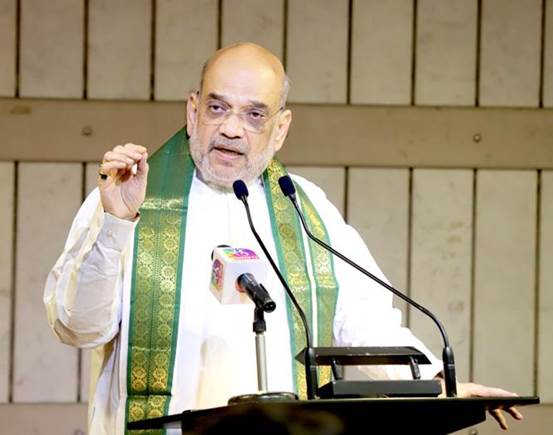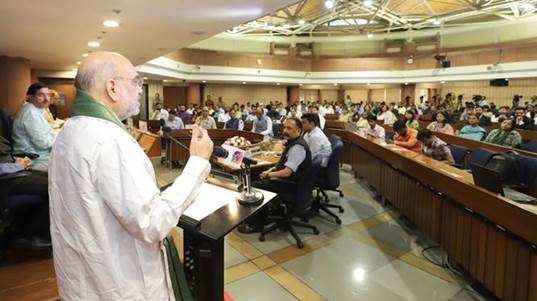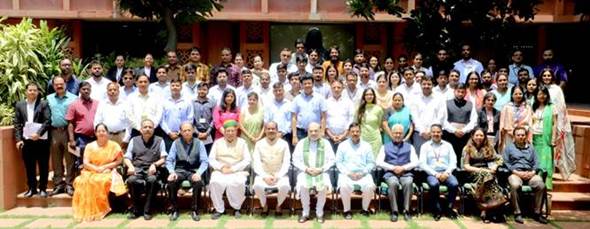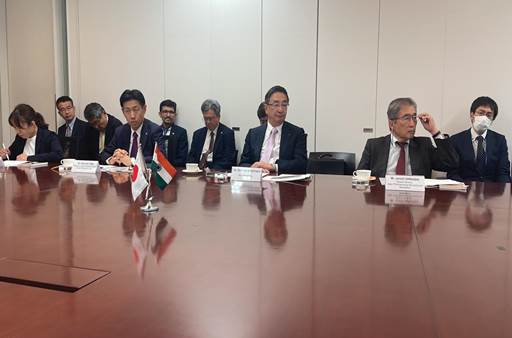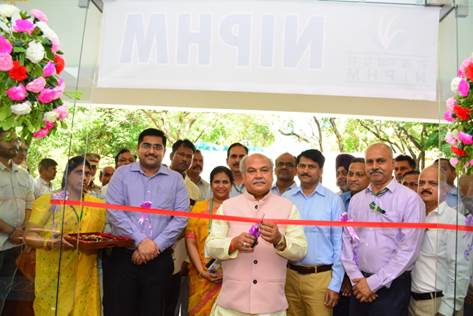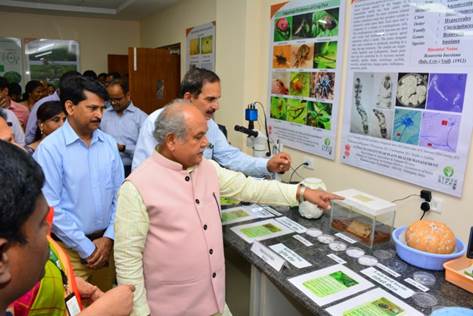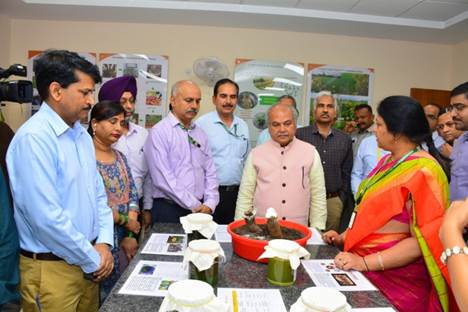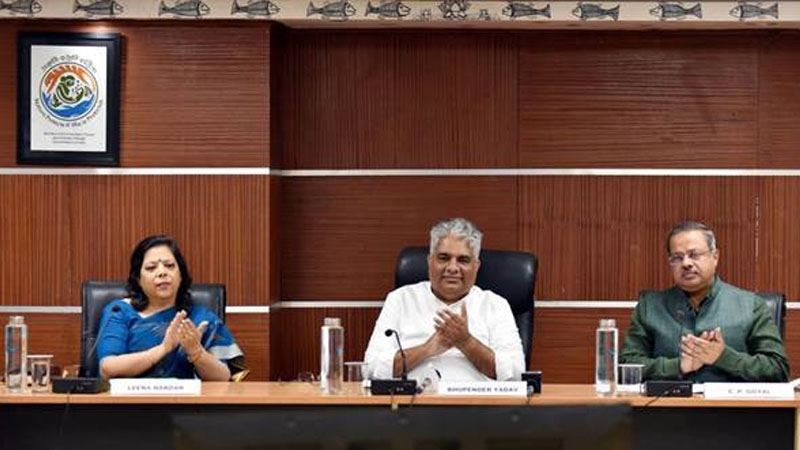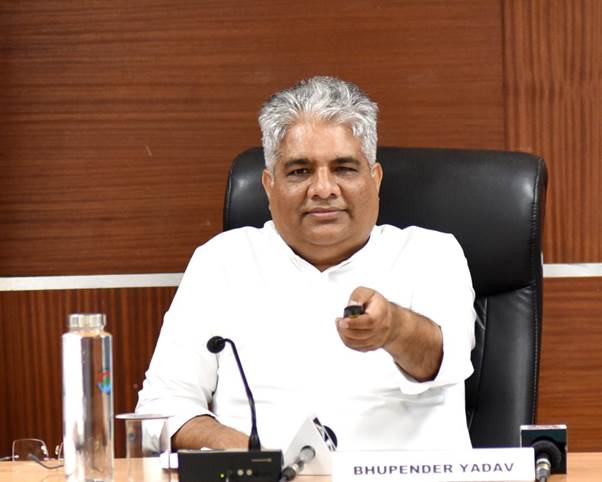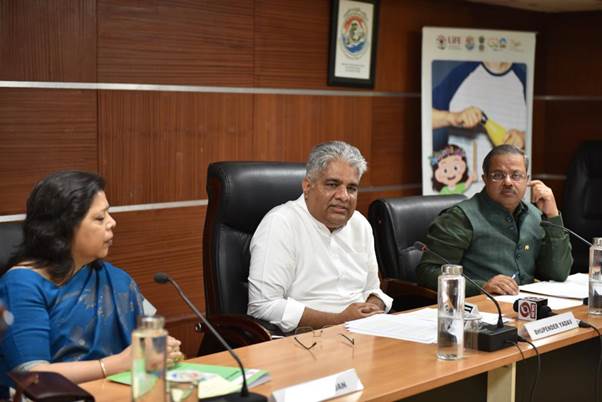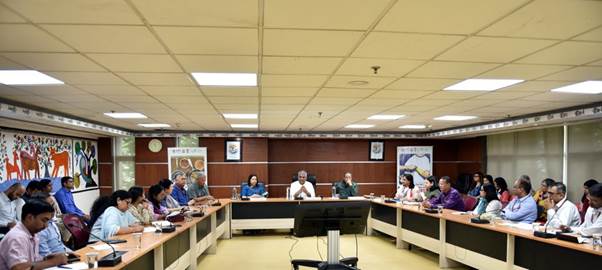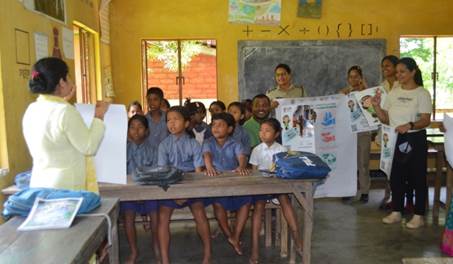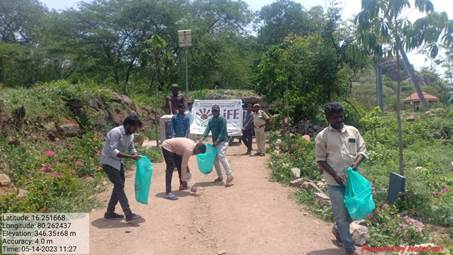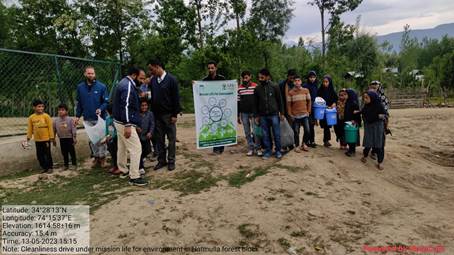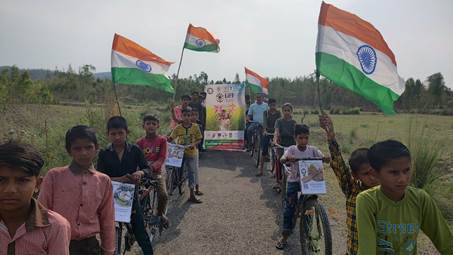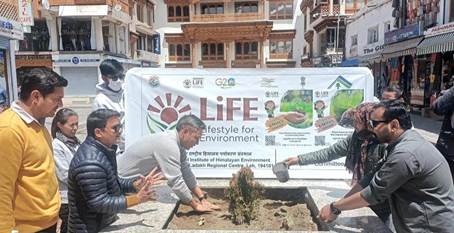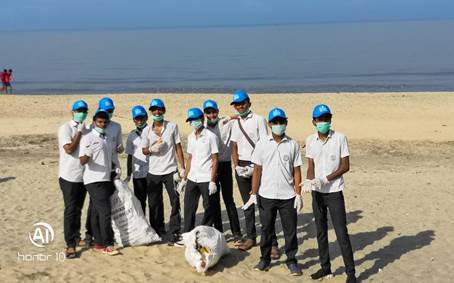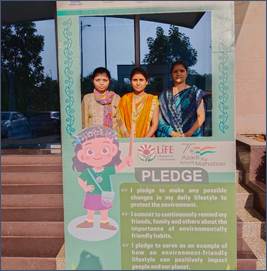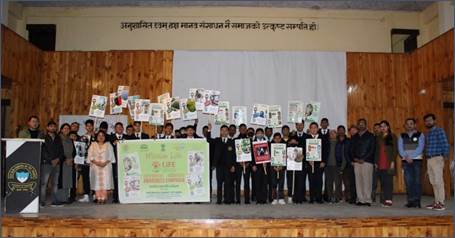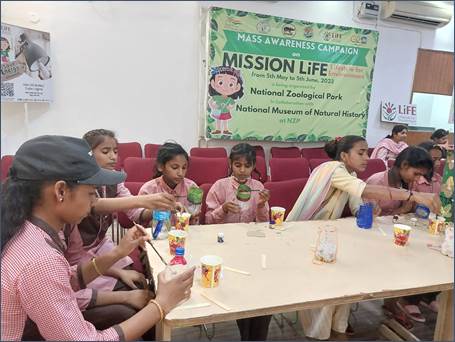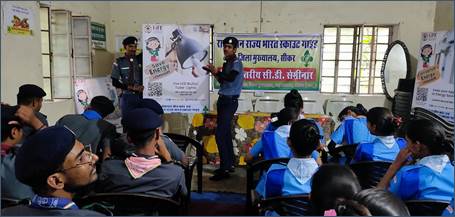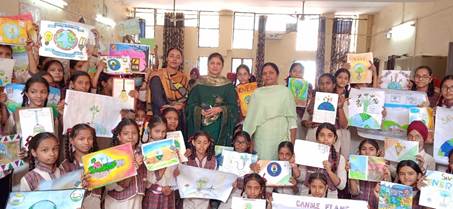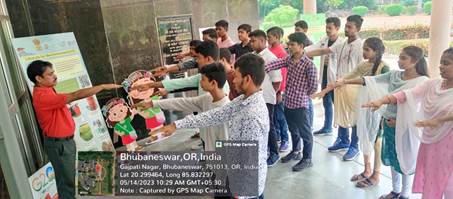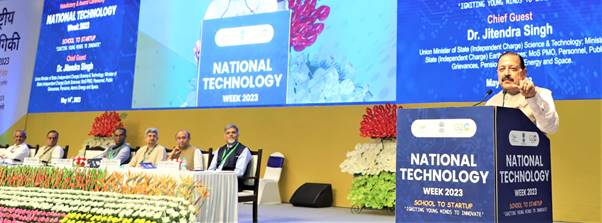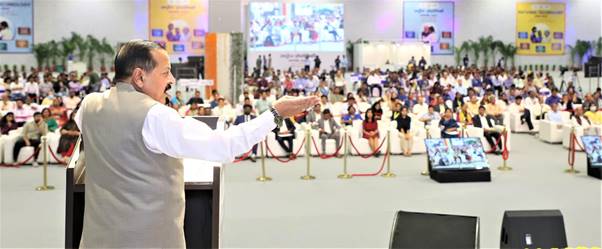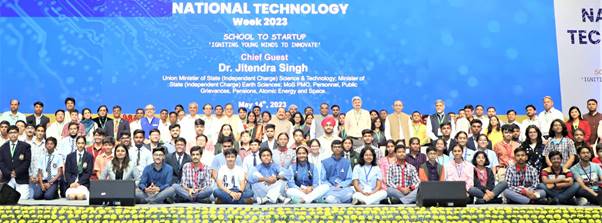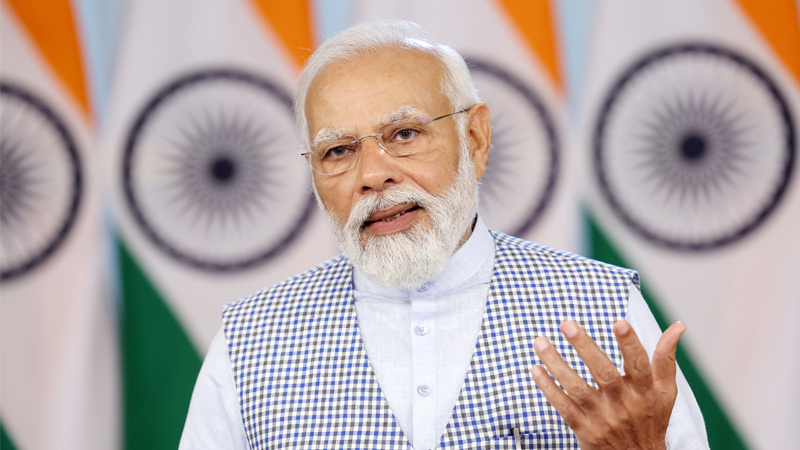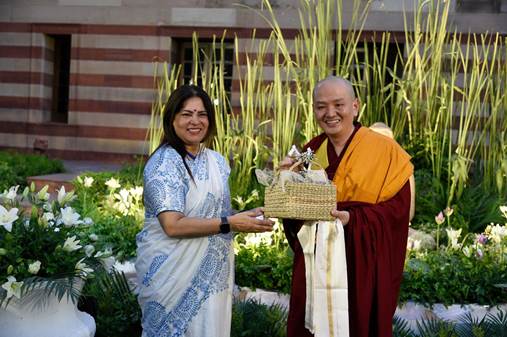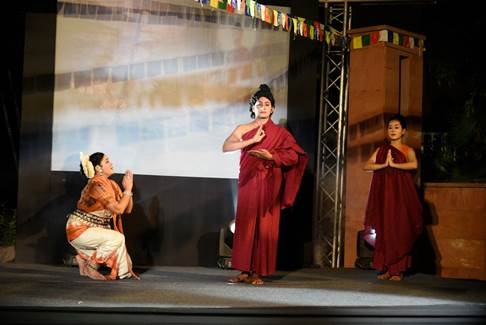The Prime Minister, Shri Narendra Modi inaugurated the programme marking National Technology Day 2023, at Pragati Maidan in New Delhi today. The programme also marked the commencement of the celebration of the 25th year of National Technology Day being held from the 11th to the 14th of May. On this momentous occasion, the Prime Minister laid the foundation stone and dedicated to the nation multiple projects related to scientific and technological advancement in the country worth more than Rs 5800 crores. This is in line with the Prime Minister’s vision of Aatmanirbhar Bharat through strengthening scientific institutions in the country.
The projects whose foundation stone would be laid include Laser Interferometer Gravitational Wave Observatory – India (LIGO-India), Hingoli; Homi Bhabha Cancer Hospital and Research Centre, Jatni, Odisha; and Platinum Jubilee Block of Tata Memorial Hospital, Mumbai.
The projects that will be dedicated to Nation include Fission Molybdenum-99 Production Facility, Mumbai; Rare Earth Permanent Magnet Plant, Visakhapatnam; National Hadron Beam Therapy Facility, Navi Mumbai; Radiological Research Unit, Navi Mumbai; Homi Bhabha Cancer Hospital and Research Centre, Visakhapatnam; and Women & Children Cancer Hospital Building, Navi Mumbai;
During the programme, the Prime Minister also inaugurated the Expo showcasing scientific & technological advancements made in India in the recent past and also took a walk-through. He also released a commemorative stamp and coin on the occasion.
Addressing the gathering, the Prime Minister said that the 11th of May is one of the most prestigious days in the history of India. He underlined that today marks the day when India’s scientists achieved the stupendous feat in Pokhran which made the entire nation proud. “I can never forget the day when Atal Ji made the announcement of India’s successful Nuclear Testing”, the Prime Minister remarked. He stated that the Pokhran Nuclear Testing not only helped India prove its scientific capabilities but also gave a boost to the global stature of the nation. “In Atal Ji’s words”, the Prime Minister said, “We have never stopped on our journey and never surrendered to any challenge that has come our way.” The Prime Minister conveyed his greetings to every citizen on the occasion of National Technology Day.
Mentioning the futuristic projects that have been inaugurated today, the Prime Minister mentioned the National Hadron Beam Therapy Facility, and Radiological Research Unit in Mumbai, the Fission Molybdenum-99 Production Facility, Rare Earth Permanent Magnet Plant in Visakhapatnam or the various Cancer Research Hospitals and said that it will give a push to the progress of the country with the help of nuclear technology. Talking about LIGO-India, the Prime Minister called LIGO to be one of the foremost science and technology initiatives of the 21st century. The observatory will bring new opportunities for research for the students and scientists, he said.
The Prime Minister reiterated that today, at the initial period of Amrit Kaal, the goals of 2047 are clear before us. “We have to make the nation Viksit and Aatmnirbhar”, said the Prime Minister emphasizing the need for creating an inclusive ecosystem for growth, innovation and Sustainable Development Goals. He underlined the importance of technology at every step and said, India is moving forward with a holistic and 360-degree approach in this regard. “India considers technology as a tool of the nation’s progress, not a means to assert its dominance”, the Prime Minister said.
Praising the theme of today’s event ‘School to Startups- igniting young minds to innovate’, the Prime Minister said that India’s future will be decided by the youth and children of today. He said that the passion, energy, and capabilities of the children and youth today are India’s big strengths. Quoting Dr A. P. J. Abdul Kalam, the Prime Minister underscored the importance of knowledge along with knowledge and said as India is developing as a Knowledge society, it is taking action with equal force. He elaborated on the strong foundation that has been created in the country during the last 9 years to ignite young minds.
The Prime Minister said that more than 10 thousand ATAL tinkering labs in 700 districts have become innovation nurseries. More importantly, 60 percent of these labs are in government and rural schools. The Prime Minister informed that 75 lakh plus students are working laboriously on more than 12 lakh innovation projects in Atal Tinkering Lab. This, the Prime Minister said, is a sign of young scientists coming right out of schools and reaching the far corners of the country and emphasizing that it is everyone’s duty to handhold them, nurture their talent and also assist them in implementing their ideas. He noted the hundreds of startups that have been incubated at Atal Innovation Centers (AIC) and said that it is emerging as the new laboratories of the ‘New India’. “The Tinker-preneurs of India will soon become leading entrepreneurs of the world”, the Prime Minister said.
Quoting Maharishi Patanjali on the importance of hard work, the Prime Minister said that measures taken after 2014 have resulted in big changes in the field of science and technology. “Startup India Campaign, Digital India, and National Education Policy help India in gaining new heights in the field”, Shri Modi said as he underlined that Science is coming out of the books and turning into patents through experiments. “The number of patents has increased from 4000 per year 10 years ago to more than 30,000 today. Registration of designs has grown from 10,000 to 15,000 in the same period. The number of trademarks has grown from less than 70,000 to more than 2,50,000”, the Prime Minister informed.
“The India of today is moving forward in every direction that is necessary to become a tech leader”, Shri Modi said. He noted that the number of tech incubation centers in the country has grown from roughly 150 in 2014 to more than 650 today. The Prime Minister also mentioned that India’s Global Innovation Index Rank has gone from 81 to the 40th position where the youth of the country are setting up their own digital ventures and startups. Drawing comparisons with 2014, the Prime Minister mentioned that the number of startups in the country has increased from roughly 100 to 1 lakh recognized startups today and it has turned India into the third largest startup ecosystem in the world. Noting India’s capability and talent, the Prime Minister pointed out that the growth took place at a time when the world is dealing with economic uncertainty. Underlining that the present moment is extremely precious for policymakers, the scientific community, research labs spread across the country and the private sector, the Prime Minister reiterated that even though the School to Startup journey will be made by the students, it is the stakeholders who must guide and encourage them at all times. The Prime Minister extended his entire support for the cause.
The Prime Minister said that when we move keeping in mind the social context of technology, technology becomes a powerful tool of empowerment. It becomes a tool for removing imbalance and promoting social justice. The Prime Minister recalled the time when technology was beyond the reach of common citizens and things like debit, credit cards were status symbols. But today, UPI has become a new normal due to its simplicity. Today India is among the countries with the highest data use. Rural intent users number has overtaken urban users. JAM trinity, GeM portal, CoWin portal, e-NAM are making technology an agent of inclusion.
The Prime Minister said that the right use of technology gives new strength to society, today the government is using technology for providing services for every stage of life. Online birth certificates, e-Pathshal and Diksha e-learning platforms, scholarship portal, Universal access number during the job period, e-Sanjivini for medical treatment, and Jeevan Praman for the elderly, such solutions are helping the citizen at every step, said the Prime Minister. He also talked about initiatives in easy passports, Digi Yatra, and DigiLocker as examples of ensuring social justice and enhancing ease of living.
Referring to the rapid changes taking place in the world of technology, the Prime Minister expressed confidence that the youth of India will lead the country in matching this pace and also crossing it. He mentioned AI tools that have emerged as the new game changers, the limitless possibilities in the health sector, and new innovations taking place in drone technology, and the therapeutics sector and said that India must take a lead in such revolutionary technology. Referring to India’s goal of a self-reliant defence sector, the Prime Minister mentioned Innovation for Defense Excellence or iDEX and expressed delight that the Ministry of Defense has procured 14 innovations from iDEX worth more than Rs 350 crores. The Prime Minister mentioned initiatives like i-create and DRDO young scientists labs and said that these efforts are being given a new direction. Touching upon the new reforms in the space sector, the Prime Minister said that India is emerging as a global game changer and highlighted technologies like SSLV and PSLV orbital platforms. Shri Modi stressed the need to provide new opportunities for the youth and startups in the space sector and also touched upon taking the lead in areas of coding, gaming and programming. The Prime Minister also highlighted policy-level initiatives like the PLI scheme at a time when India is increasing its presence in new avenues like semiconductors.
Throwing light on the role of hackathons in innovation and security, the Prime Minister underlined that the government is continuously promoting the hackathon culture where students take up new challenges and emphasized the need for hand-holding and creating a framework for this. He suggested that an institutionalized system be kept in place to address the youth coming out of Atal Tinkering Labs. “Can we similarly identify 100 labs in the country in different areas, which should be made youth driven?”, the Prime Minister asked. Highlighting the special focus areas of clean energy and natural farming, the Prime Minister stressed promoting research and technology. Concluding the address, the Prime Minister expressed confidence that National Technology Week can play an important role in realizing these possibilities.
Union Minister for Defence, Shri Rajnath Singh and Union Minister of State for Personnel, Public Grievances and Pensions, Shri Jitendra Singh were present on the occasion among others.
Background
LIGO-India, to be developed in Hingoli, Maharashtra, will be one of the handful Laser Interferometer Gravitational wave observatories in the world. It is an extremely sensitive interferometer of 4 km arm length capable of sensing gravitational waves generated during the merger of massive astrophysical objects such as black holes, and neutron stars. The LIGO-India will work in synchronization with two observatories operating in the United States; one in Hanford, Washington and the other in Livingston, Louisiana.
Rare Earth Permanent Magnets are produced primarily in developed countries. The facility for the production of the Rare Earth Permanent Magnet has been developed on the campus of the Bhabha Atomic Research Centre at Visakhapatnam. The facility has been established based on indigenous technology and using indigenous Rare Earth material extracted from indigenous resources. With this facility, India will join a select group of nations with the capacity to produce Rare Earth Permanent Magnets.
The National Hadron Beam Therapy Facility of Tata Memorial Centre, Navi Mumbai is a state-of-the-art facility which works to undertake highly precise delivery of radiation to the tumor with minimal dose to the surrounding normal structures. The precise delivery of dose to target tissue reduces the early and delayed side effects of radiation therapy.
Fission Molybdenum-99 Production Facility is located on the Trombay Campus of the Bhabha Atomic Research Centre. Molybdenum-99 is the parent of Technetium-99m, which is used in more than 85% of imaging procedures for the early detection of cancer, heart disease etc. The facility is expected to enable about 9 to 10 lakh patient scans per year.
The laying of the foundation stone and dedication of several Cancer Hospitals and facilities will decentralize and enhance the provisioning of world-class cancer care in different regions of the country.
Atal Innovation Mission and other components
The programme and celebrations marking National Technology Day 2023 have a special focus on Atal Innovation Mission (AIM). Highlighting the theme of this year’s National Technology Day, the AIM Pavilion will showcase multiple innovative projects and provide an opportunity for the visitors to witness live tinkering sessions, engage in tinkering activities, and witness outstanding innovations and products by Startups. With multiple engagement zones such as AR/VR, Defense Tech, DigiYatra, Textile, and Life Sciences etc.
During the programme, Prime Minister also inaugurated the Expo showcasing scientific & technological advancements made in India in the recent past. He will also release a commemorative stamp and coin on the occasion.
The celebration of National Technology Day was started by former Prime Minister Shri Atal Bihari Vajpayee in 1999 to honour Indian scientists, engineers and technologists, who worked for India’s scientific and technological advancement and ensured the successful conduct of Pokhran tests in May 1998. Since then, National Technology Day is observed every year on May 11. It is celebrated with a new and different theme every year. This year’s theme is ‘School to Startups- Igniting Young Minds to Innovate’.


